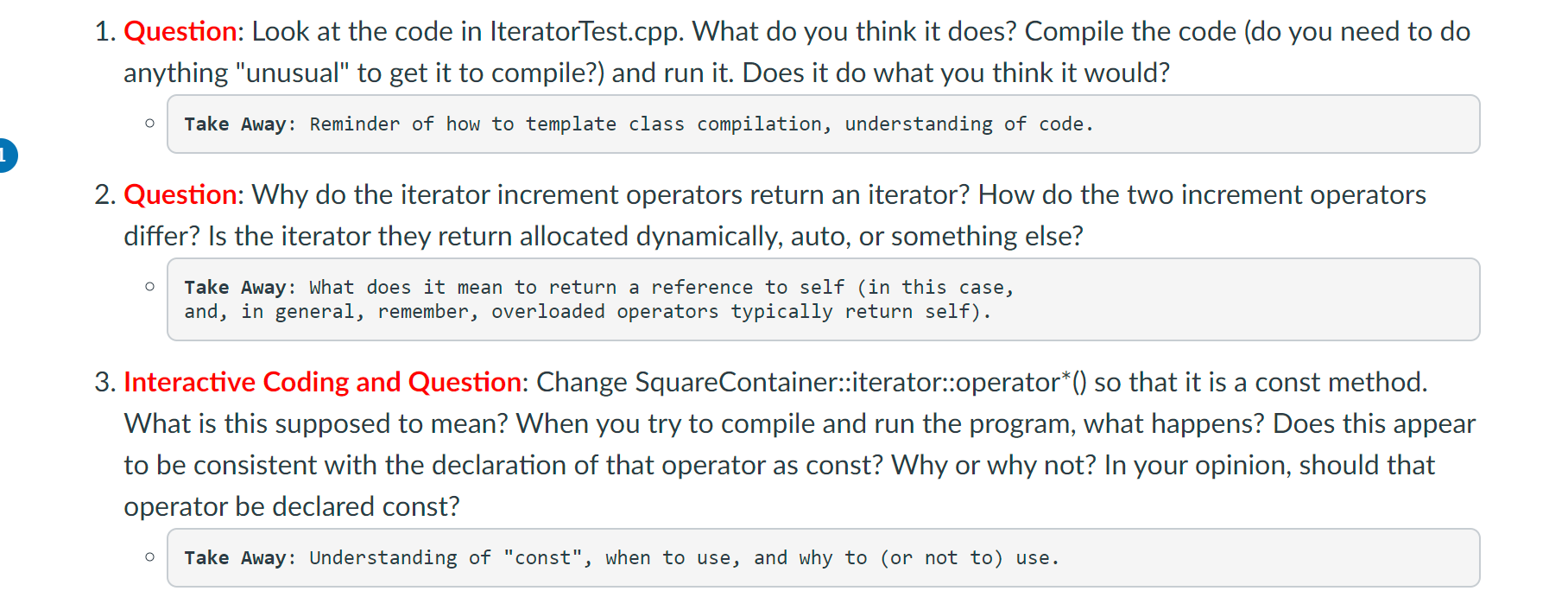Question
Need help with all three questions #pragma once class SquareContainer { public: class iterator; // forward declaration friend class iterator; // friend declaration /*! @class
Need help with all three questions 
#pragma once
class SquareContainer {
public:
class iterator; // forward declaration
friend class iterator; // friend declaration
/*!
@class iterator
This is a nested class. Note that it is in the public section of
SquareContainer
*/
class iterator {
public:
/*!
Initializes the iterator by associating it with a
SquareContainer object, starting it at the beginning.
*/
iterator(SquareContainer* c, unsigned xloc = 0, unsigned yloc = 0) :
theContainer(c), x(xloc), y(yloc) {}
// You may need a copy constructor; we don't have it here
// iterator(const iterator& it);
// Prefix form of "next" operator
iterator operator++();
// Postfix form of "next"
iterator operator++(int);
// Returns the current item
int& operator*() const;
// Comparison operators
bool operator==(const iterator& rhs) const;
bool operator!=(const iterator& rhs) const;
private:
/*! Keep track of where we are in theContainer */
unsigned x, y;
/*! The SquareContainer object this iterator is associated with */
SquareContainer* theContainer;
};
//Returns iterator that refers to first item, using iterator constructor
iterator begin(void) { return iterator(this); }
const iterator end(void) { return iterator(this, 0, ySize); }
private:
static const unsigned xSize = 5;
static const unsigned ySize = 5;
int contents[xSize][ySize];
};
// Remember, we can't compile template classes separately, so we
// include it here and don't mention it on the command line.
1. Question: Look at the code in IteratorTest.cpp. What do you think it does? Compile the code (do you need to do anything "unusual" to get it to compile?) and run it. Does it do what you think it would? Take Away: Reminder of how to template class compilation, understanding of code. 2. Question: Why do the iterator increment operators return an iterator? How do the two increment operators differ? Is the iterator they return allocated dynamically, auto, or something else? - Take Away: What does it mean to return a reference to self (in this case, and, in general, remember, overloaded operators typically return self). 3. Interactive Coding and Question: Change SquareContainer::iterator::operator*() so that it is a const method. What is this supposed to mean? When you try to compile and run the program, what happens? Does this appear to be consistent with the declaration of that operator as const? Why or why not? In your opinion, should that operator be declared const? Take Away: Understanding of "const", when to use, and why to (or not to) use
Step by Step Solution
There are 3 Steps involved in it
Step: 1

Get Instant Access to Expert-Tailored Solutions
See step-by-step solutions with expert insights and AI powered tools for academic success
Step: 2

Step: 3

Ace Your Homework with AI
Get the answers you need in no time with our AI-driven, step-by-step assistance
Get Started


